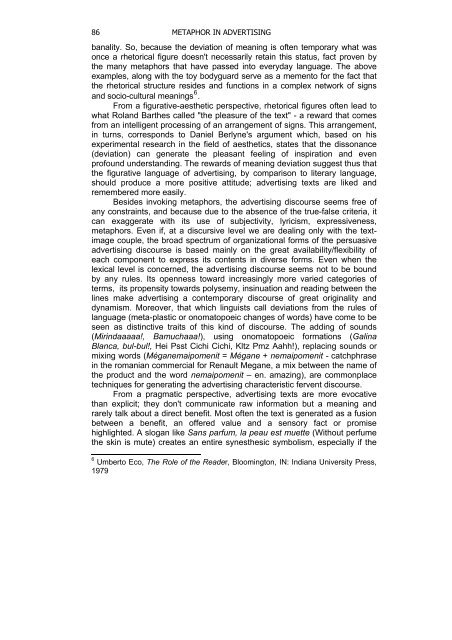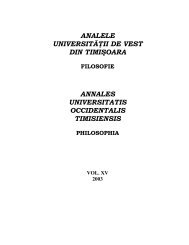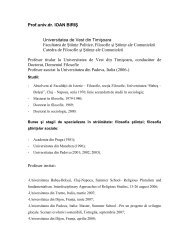VOL. IV (XXI) 2009 - Departamentul de Filosofie si Stiinte ale ...
VOL. IV (XXI) 2009 - Departamentul de Filosofie si Stiinte ale ...
VOL. IV (XXI) 2009 - Departamentul de Filosofie si Stiinte ale ...
You also want an ePaper? Increase the reach of your titles
YUMPU automatically turns print PDFs into web optimized ePapers that Google loves.
86 METAPHOR IN ADVERTISING<br />
banality. So, because the <strong>de</strong>viation of meaning is often temporary what was<br />
once a rhetorical figure doesn't necessarily retain this status, fact proven by<br />
the many metaphors that have passed into everyday language. The above<br />
examples, along with the toy bodyguard serve as a memento for the fact that<br />
the rhetorical structure re<strong>si</strong><strong>de</strong>s and functions in a complex network of <strong>si</strong>gns<br />
and socio-cultural meanings 6 .<br />
From a figurative-aesthetic perspective, rhetorical figures often lead to<br />
what Roland Barthes called "the pleasure of the text" - a reward that comes<br />
from an intelligent proces<strong>si</strong>ng of an arrangement of <strong>si</strong>gns. This arrangement,<br />
in turns, corresponds to Daniel Berlyne's argument which, based on his<br />
experimental research in the field of aesthetics, states that the dissonance<br />
(<strong>de</strong>viation) can generate the pleasant feeling of inspiration and even<br />
profound un<strong>de</strong>rstanding. The rewards of meaning <strong>de</strong>viation suggest thus that<br />
the figurative language of adverti<strong>si</strong>ng, by comparison to literary language,<br />
should produce a more po<strong>si</strong>tive attitu<strong>de</strong>; adverti<strong>si</strong>ng texts are liked and<br />
remembered more ea<strong>si</strong>ly.<br />
Be<strong>si</strong><strong>de</strong>s invoking metaphors, the adverti<strong>si</strong>ng discourse seems free of<br />
any constraints, and because due to the absence of the true-false criteria, it<br />
can exaggerate with its use of subjectivity, lyricism, expres<strong>si</strong>veness,<br />
metaphors. Even if, at a discur<strong>si</strong>ve level we are <strong>de</strong>aling only with the textimage<br />
couple, the broad spectrum of organizational forms of the persua<strong>si</strong>ve<br />
adverti<strong>si</strong>ng discourse is based mainly on the great availability/flexibility of<br />
each component to express its contents in diverse forms. Even when the<br />
lexical level is concerned, the adverti<strong>si</strong>ng discourse seems not to be bound<br />
by any rules. Its openness toward increa<strong>si</strong>ngly more varied categories of<br />
terms, its propen<strong>si</strong>ty towards polysemy, in<strong>si</strong>nuation and reading between the<br />
lines make adverti<strong>si</strong>ng a contemporary discourse of great originality and<br />
dynamism. Moreover, that which linguists call <strong>de</strong>viations from the rules of<br />
language (meta-plastic or onomatopoeic changes of words) have come to be<br />
seen as distinctive traits of this kind of discourse. The adding of sounds<br />
(Mirindaaaaa!, Bamuchaaa!), u<strong>si</strong>ng onomatopoeic formations (Galina<br />
Blanca, bul-bul!, Hei Psst Cichi Cichi, Kltz Pmz Aahh!), replacing sounds or<br />
mixing words (Méganemaipomenit = Mégane + nemaipomenit - catchphrase<br />
in the romanian commercial for Renault Megane, a mix between the name of<br />
the product and the word nemaipomenit – en. amazing), are commonplace<br />
techniques for generating the adverti<strong>si</strong>ng characteristic fervent discourse.<br />
From a pragmatic perspective, adverti<strong>si</strong>ng texts are more evocative<br />
than explicit; they don't communicate raw information but a meaning and<br />
rarely talk about a direct benefit. Most often the text is generated as a fu<strong>si</strong>on<br />
between a benefit, an offered value and a sensory fact or promise<br />
highlighted. A slogan like Sans parfum, la peau est muette (Without perfume<br />
the skin is mute) creates an entire synesthe<strong>si</strong>c symbolism, especially if the<br />
6<br />
Umberto Eco, The Role of the Rea<strong>de</strong>r, Bloomington, IN: Indiana Univer<strong>si</strong>ty Press,<br />
1979




